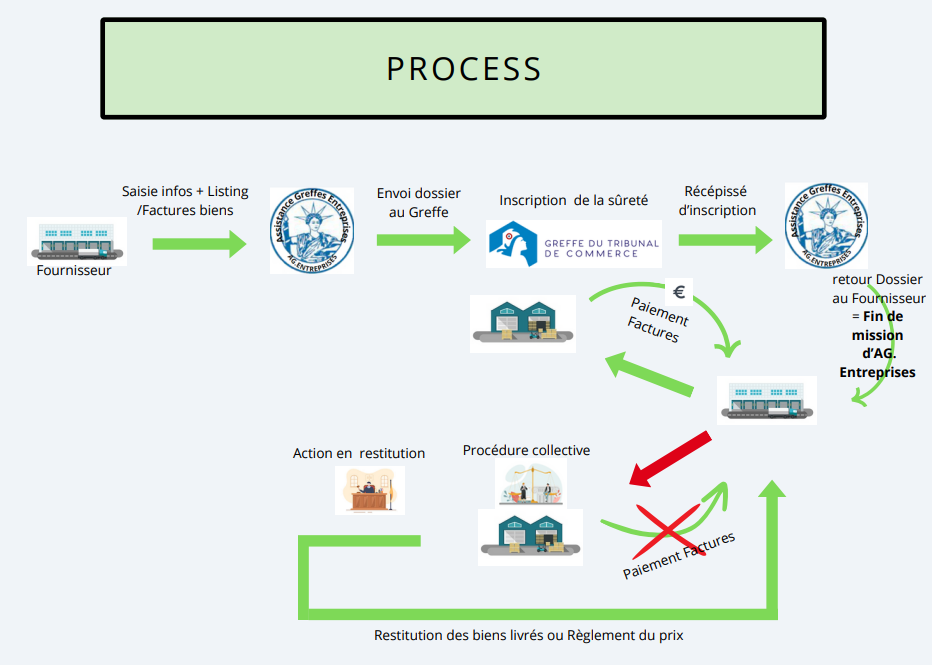The retention-of-title clause: protecting your interests
It is often used in commercial transactions to protect the seller’s interests in the event of non-payment by the buyer.
Find out how to enforce a retention of title clause on a commercial debt.
Inclusion of the retention of title clause in the contract
Retention of title must be agreed in writing (Article 2368 of the French Civil Code).
The retention-of-title clause may be accepted explicitly, if the purchaser signs a document containing the retention-of-title clause, or implicitly, if the purchaser performs the contract after receiving a document on which the clause is clearly and legibly stated.
Goods must be identifiable and individualized.
Although the fungibility of certain goods subject to retention of title may be accepted, the recurrence of registrations in the course of deliveries will contribute to the effectiveness of this clause.
It is essential to follow the appropriate legal procedures and to consult a legal professional to ensure that all steps are in compliance with the legislation in force in your jurisdiction.
Laws can vary from place to place, and it is crucial to respect the rules and deadlines to effectively enforce the retention of title clause.
How to set it up
Here are the steps to follow for the proper use of a retention of title clause:
- Examine the initial contract : This is a crucial step in understanding the terms and conditions of the retention-of-title clause as set out in the initial contract.
- Notification to the buyer: It is important to inform the buyer of the existence of the retention of title clause.
This can be done explicitly by signing a document, or implicitly by executing the contract with a clause clearly mentioned. - Checking the terms of the clause: It’s essential to ensure that all the conditions specified in the clause are correctly met.
This can include details such as identification of goods, payment terms, etc. - Formal notice: If the buyer fails to comply with the terms of the clause, formal notice may be required.
This formally notifies the buyer of his failure to comply with the terms of the contract. - Negotiation: Before resorting to legal recourse, negotiation can be an intermediate step in resolving a dispute amicably.
This can be advantageous for both parties. - Legal remedies: If negotiation fails, legal remedies may be necessary to enforce the retention-of-title clause.
This may include legal action to recover the goods or payment in full. - Hire professionals: It is advisable to consult legal professionals to ensure that all legal steps are in line with current legislation.
This can strengthen the seller’s position and guarantee correct application of the clause.
Companies such as AG.
ENTREPRISES can assist you in this process.
To find out more, contact our partner at: florencezanone@outlook.fr
Use of the reserve clause in the event of insolvency proceedings
In the event of insolvency proceedings, such as receivership or compulsory liquidation, enforcing the retention of title clause can be complex if it has not been registered with the clerk of the commercial court.
Insolvency proceedings are governed by specific rules designed to protect the interests of all creditors and ensure a fair distribution of the debtor’s assets.
Registration of the retention-of-title clause with the Clerk of the Commercial Court makes it a security interest (article L. 624-10 of the French Commercial Code).
In the event of insolvency proceedings, this security interest enables the person reserving ownership :
- prove ownership of the goods in question and thus enable immediate restitution action, reducing the restitution or settlement process by several months and the risk of goods disappearing
- to have the agent deposit the sale price of the goods in the event of transfer to sub-purchasers
- to have the unpaid goods returned to him or paid for by the agent
 Here are the steps to consider in a collective procedure:
Here are the steps to consider in a collective procedure:
- Declaration of claim on assets to the insolvency authorities
- Notification of retention of title clause
- Court review
- Proposed regulation
- Legal remedies
- Procedure follow-up
Tips for the proper use of the retention-of-title clause
This retention of title clause is not intended to be enforced.
Its main purpose is to protect you in the event of receivables from a customer.
To avoid unpleasant surprises, we can only recommend that you identify vulnerable customers likely to end up under the yoke of collective proceedings.
For automatic application, you’ll need to register them with the Greffe du Tribunal de Commerce (Commercial Court Registry) at the customer’s head office.
Once you’ve identified your customers, check that this clause is included in their contracts and invoices.
To be valid, this clause must be written and accepted before the goods are delivered.
It is therefore impossible to have it signed after the fact.
However, it is possible to include this clause in future contracts or invoices.
Prevention strategies
Remember to register retention-of-title clauses on deliveries/invoices as soon as you spot a bad payer.
You should also keep an eye out for any insolvency proceedings involving customers for whom the clause has been registered.
You have a period of 3 months from publication of the collective proceedings in the BODACC, unless the contract is published, in which case the action for revendication is not necessary and you can take immediate action for restitution.
Key points to remember: This clause is enforceable by the debtor if he questions its wording, wording, existence or acceptance date.
The retention of title clause is not automatically enforced, unless it is published.
It must be formulated to the parties involved in the insolvency proceedings in order to be applied.
It will be applied, if possible, to the assets designated by the clause.
